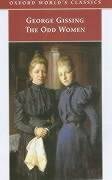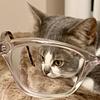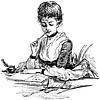Take a photo of a barcode or cover
reflective
medium-paced
Plot or Character Driven:
Character
Strong character development:
Complicated
Loveable characters:
No
Diverse cast of characters:
No
Flaws of characters a main focus:
Yes
Well, I did say I was ready to read about nineteenth century women with agency. George Gissing certainly delivers with The Odd Women. Absolutely brilliant, and I really do mean brilliant.
He is rapidly climbing up my list of top ten favorite writers. All characters are occupied with questions around nascent feminism, what men and women are themselves as well as ought to be to one another, showing as wide a variety of nuances as you'd find today.
But it's not just the topic that's interesting. The book also has a page turner of a plot, I'm not yet done pondering the characters, not one of them being less than three dimensional, and it just blows me away how genuinely true and lifelike the situations and descriptions felt. I had to check the year of publication to ensure myself it really was that old - it is indeed, published in 1893.
In a sense it starts out as "what if Mr. Bennett had died", leaving no fewer than six genteel daughters behind with little to live on, forcing the girls to fend for themselves independently in a society that is made for wives and daughters. Preferably unthinking ones that can then de ridiculed for being uneducated and silly. But it shows so much variety and such realism, with the rawness of alcoholism, crossing lines you never thought you would, regretting decisions and no shying away from mentioning at least some physicality between lovers, that I feel I have not yet unearthed all there is to find after reading it just once.
The intelligent, independent aka 'odd' women trying to help them out - themselves facing their own challenges - have groundbreaking views on marriage, independence and women making a living for the time they're living in. But there's more to discover, a discussion about being content where you are versus chasing "an endless gallery of pictures" is extremely recognizable so many years later.
He is rapidly climbing up my list of top ten favorite writers. All characters are occupied with questions around nascent feminism, what men and women are themselves as well as ought to be to one another, showing as wide a variety of nuances as you'd find today.
But it's not just the topic that's interesting. The book also has a page turner of a plot, I'm not yet done pondering the characters, not one of them being less than three dimensional, and it just blows me away how genuinely true and lifelike the situations and descriptions felt. I had to check the year of publication to ensure myself it really was that old - it is indeed, published in 1893.
In a sense it starts out as "what if Mr. Bennett had died", leaving no fewer than six genteel daughters behind with little to live on, forcing the girls to fend for themselves independently in a society that is made for wives and daughters. Preferably unthinking ones that can then de ridiculed for being uneducated and silly. But it shows so much variety and such realism, with the rawness of alcoholism, crossing lines you never thought you would, regretting decisions and no shying away from mentioning at least some physicality between lovers, that I feel I have not yet unearthed all there is to find after reading it just once.
The intelligent, independent aka 'odd' women trying to help them out - themselves facing their own challenges - have groundbreaking views on marriage, independence and women making a living for the time they're living in. But there's more to discover, a discussion about being content where you are versus chasing "an endless gallery of pictures" is extremely recognizable so many years later.
"But do you know that there are half a million more women than men in this unhappy country of ours...so many odd women - no making a pair with them. The pessimists call them useless, lost, futile lives. I, naturally - being one of them myself - take another view."
This is a story about women and their role in the late Victorian society. Back when it was a woman's job to marry and produce an heir and a spare. You know, before women were seen as living, thinking, capable human beings, but as mere wives..or, if they failed to capture a husband, as creatures to be deeply pitied.
At the center of the story are two separate but interconnected storylines: One deals with the Madden sisters, Monica Madden especially. Three of the six sisters are dead, and the two eldest are unmarried and living in severe poverty. They can barely keep themselves alive. Monica, the youngest, marries Mr Widdowson to avoid the poverty that have broken her sisters. But Mr Widdowson is a creepy, jealous (and when I say jealous, boy, do I mean jealous!) stalkerish kind of man who can't understand that Monica has thoughts and wishes and feelings of her own. She is a wife and should be satisfied with her wifely duties. Like, looking after the servants and sewing pretty things. Friends she cannot have.
The other storyline deals with Miss Barfoot and Miss Nunn, two unmarried women who teach typewriting to young girls. They are early feminists and fight for women's rights. Miss Nunn even abhors marriages and pities women who marry because "real" women are strong and independent and fight for their collective welfare. But then Mr Barfoot, Miss Barfoot's cousin, comes along and starts wooing Miss Nunn...
And just because I loved it, have a look at this piece of conversation between Monica Madden and Miss Nunn:
""But you wouldn't say so, Miss Nunn, if you knew how terribly hard it is for many girls to find a place, even now."
"I know it perfectly well. And I wish it were harder. I wish girls fell down and died of hunger in the streets, instead of creeping to their garrets and the hospitals. I should like to see their dead bodies collected together in some open place, for the crowd to stare at."
Monica gazed at her with wide eyes.
"You mean, I suppose, that people would try to reform things."
"Who knows? Perhaps they might only congratulate each other that a few of the superfluous females had been struck off.""
This sets the tone for the book. Should women marry to avoid poverty and loneliness, or should they stay independent? And what if their marriage is a mistake? How do they possibly get out of it when marriage is for life? And the remarkable thing is that this was written by a man. More power to him:)
This is a story about women and their role in the late Victorian society. Back when it was a woman's job to marry and produce an heir and a spare. You know, before women were seen as living, thinking, capable human beings, but as mere wives..or, if they failed to capture a husband, as creatures to be deeply pitied.
At the center of the story are two separate but interconnected storylines: One deals with the Madden sisters, Monica Madden especially. Three of the six sisters are dead, and the two eldest are unmarried and living in severe poverty. They can barely keep themselves alive. Monica, the youngest, marries Mr Widdowson to avoid the poverty that have broken her sisters. But Mr Widdowson is a creepy, jealous (and when I say jealous, boy, do I mean jealous!) stalkerish kind of man who can't understand that Monica has thoughts and wishes and feelings of her own. She is a wife and should be satisfied with her wifely duties. Like, looking after the servants and sewing pretty things. Friends she cannot have.
The other storyline deals with Miss Barfoot and Miss Nunn, two unmarried women who teach typewriting to young girls. They are early feminists and fight for women's rights. Miss Nunn even abhors marriages and pities women who marry because "real" women are strong and independent and fight for their collective welfare. But then Mr Barfoot, Miss Barfoot's cousin, comes along and starts wooing Miss Nunn...
And just because I loved it, have a look at this piece of conversation between Monica Madden and Miss Nunn:
""But you wouldn't say so, Miss Nunn, if you knew how terribly hard it is for many girls to find a place, even now."
"I know it perfectly well. And I wish it were harder. I wish girls fell down and died of hunger in the streets, instead of creeping to their garrets and the hospitals. I should like to see their dead bodies collected together in some open place, for the crowd to stare at."
Monica gazed at her with wide eyes.
"You mean, I suppose, that people would try to reform things."
"Who knows? Perhaps they might only congratulate each other that a few of the superfluous females had been struck off.""
This sets the tone for the book. Should women marry to avoid poverty and loneliness, or should they stay independent? And what if their marriage is a mistake? How do they possibly get out of it when marriage is for life? And the remarkable thing is that this was written by a man. More power to him:)
challenging
dark
emotional
reflective
sad
tense
challenging
dark
reflective
sad
slow-paced
Plot or Character Driven:
Character
Strong character development:
Yes
Loveable characters:
Complicated
Diverse cast of characters:
No
Flaws of characters a main focus:
Yes
The Odd WomenIt’s strange that an obscure book from 1893 should have so many things in common with 2015. George Gissing’s novel, The Odd Women, is the story of two women who are caught in the war between the sexes. Monica Madden, terrified of living in poverty, married the wrong man. Rhoda Nunn is an early feminist whose pride keeps her on the front lines of the gender wars...
Read the rest of my review at A Bookish Type.
Read the rest of my review at A Bookish Type.
An interesting portrayal of English society in transition. No longer the country of Austen or Trollope, where the only acceptable fates for a young middle-class woman were either marriage (preferably financially secure) of the quasi-servant state of a governess. By the late 19th century the first glimmerings of the women's rights movement was suggesting that, just maybe, it might be a good idea if women could earn their own living, rather than being dependent on a husband.
In this book the Madden sisters are products of the old society. Brought up to be wives and mothers, they are impoverished by the death of their father and strive to eke out a living, hoping only that Monica, the youngest and prettiest of them, will save the family through a good marriage. On the other end of the spectrum, Mary Barfoot and Rhoda Nunn are fiercely proud proto-feminists who live by their own resources and teach other women to do the same. (Ironically, by becoming typists, which was then a man's domain.)
Both Monica and Rhoda make practical choices for providing for their own future. But then, unexpectedly, love intrudes on each of them and upsets all their plans.
The characterizations were good. I felt empathy for just about everyone in the book. Which meant that I would at times like to take one by the shoulders and shake vigorously, yelling at them to not be such an ass.
The ending is a bit abrupt. As if Gissing was nearing a deadline and needed to wrap the story lines up quickly.
In this book the Madden sisters are products of the old society. Brought up to be wives and mothers, they are impoverished by the death of their father and strive to eke out a living, hoping only that Monica, the youngest and prettiest of them, will save the family through a good marriage. On the other end of the spectrum, Mary Barfoot and Rhoda Nunn are fiercely proud proto-feminists who live by their own resources and teach other women to do the same. (Ironically, by becoming typists, which was then a man's domain.)
Both Monica and Rhoda make practical choices for providing for their own future. But then, unexpectedly, love intrudes on each of them and upsets all their plans.
The characterizations were good. I felt empathy for just about everyone in the book. Which meant that I would at times like to take one by the shoulders and shake vigorously, yelling at them to not be such an ass.
The ending is a bit abrupt. As if Gissing was nearing a deadline and needed to wrap the story lines up quickly.
1. people who go to school with me mind your business
2. this book was nothing. literally. nothing. i couldn't tell you a single thing that was meaningful
2. this book was nothing. literally. nothing. i couldn't tell you a single thing that was meaningful
challenging
funny
reflective
sad
medium-paced
Plot or Character Driven:
A mix
Strong character development:
Complicated
Loveable characters:
Complicated
Diverse cast of characters:
No
Flaws of characters a main focus:
Yes
challenging
informative
reflective
medium-paced
Plot or Character Driven:
Character
Strong character development:
Yes
Loveable characters:
Complicated
Diverse cast of characters:
N/A
Flaws of characters a main focus:
Yes




